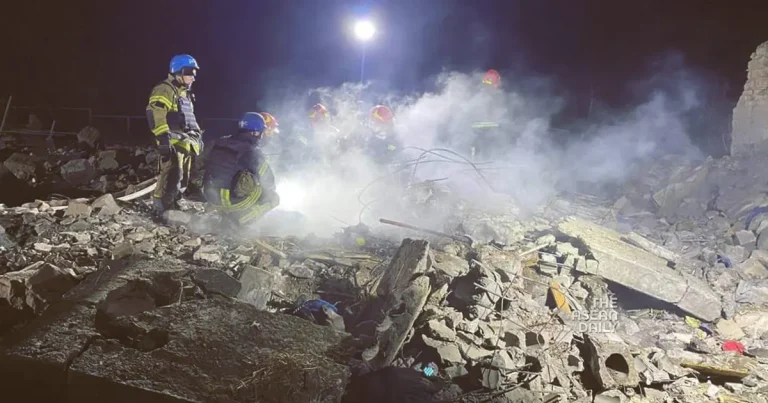7-1-204 (KYIV) At least 11 people, including five children, tragically lost their lives in a Russian missile strike on the town of Pokrovsk in eastern Ukraine on Saturday (Jan 6), as the intensity of bombardments continues to escalate, according to the regional governor. The ongoing war, sparked by Russia’s invasion in February 2022, is nearing the end of its second year, with a surge in strikes and heavy casualties reported in both Ukraine and Russia.
Despite the heightened attacks, the front line has seen minimal movement. The area was hit by S-300 missiles, resulting in eight additional injuries alongside the fatalities. Vadim Filashkin, the head of the Donetsk region, shared images on Telegram showing rescue workers sifting through the debris of the attack, which damaged six houses in Pokrovsk and one in the nearby Rivne community.
Emergency services have indicated that the death toll may rise, as six individuals, including two children, are believed to be trapped under the rubble of one of the buildings. Ukrainian President Volodymyr Zelenskyy strongly condemned the attacks, stating that “the Russians just hit ordinary residential buildings, private houses.” He assured that no Russian strike would go unanswered.
Pokrovsk, with a pre-war population of 60,000, had previously experienced a deadly bombardment last August, resulting in nine deaths and 82 injuries. The town is situated around fifty kilometers from the front line of the conflict.
In other parts of Ukraine, shelling in the Kherson region in the south left one adult and two children injured. One person was killed in Toretsk, near Bakhmut, and another fatality, along with two injuries, occurred in Nikopol in the east, according to the respective regional authorities.
Escalation of Strikes:
In the Russian-occupied territories of eastern Ukraine, two individuals were killed by Ukrainian shelling in Makiivka and Horlivka, with several others sustaining injuries, as reported by local authorities installed by Moscow.
Russia announced on Saturday that its forces had successfully intercepted four Ukrainian missiles over Moscow-annexed Crimea during the previous night. This attack followed Russia’s claim to have repelled a drone attack by Ukraine on Crimea, shooting down 36 drones over the peninsula.
Ukraine stated that it had targeted the Saki airbase in western Crimea. Mykola Oleshchuk, Ukraine’s air force commander, confirmed the attack on social media, stating, “Saki airfield! All targets have been shot!”
Since the start of Moscow’s full-scale offensive, Ukraine has consistently targeted Crimea, which was annexed by Russia in 2014. Russia also reported the destruction of six Ukrainian Neptune naval missiles over the Black Sea.
The number of strikes on both sides has escalated in recent days, with Russia launching mass bombings on Ukrainian towns on two occasions: December 29, resulting in 55 deaths, and Wednesday, which claimed six lives. Ukraine, in turn, has repeatedly targeted the Russian town of Belgorod, located 50 kilometers from the border. Last Saturday, an unprecedented attack on Belgorod resulted in 25 fatalities, with hundreds injured.
In response to the risk of Ukrainian bombardments, authorities in Belgorod canceled the evening Orthodox Christmas celebrations on Saturday. The city had already extended school holidays until January 19 and offered evacuation options for its 300,000 residents. These extraordinary measures for a major Russian city strike a blow to the Kremlin’s efforts to portray the conflict as not directly affecting the safety and daily life of Russians.
In another sign of discontent for Russian leaders, a group of wives whose husbands are fighting in Ukraine mobilized to symbolically lay flowers at the flame of the unknown soldier beneath the walls of the Kremlin, demanding the return of their loved ones from the front. Anger has been mounting among relatives of reservists, whom President Vladimir Putin mobilized in September 2022, seven months after the initial invasion of Ukraine. Authorities have been cautious in dealing with the sensitive issue of mobilization and have refrained from suppressing signs of discontent.
Despite the winter cold, around 15 women gathered to place red flowers at the site in the heart of the capital on Saturday. Paulina, a mother of a one-year-old child, described the protest as “the only peaceful action that has not yet been banned by law.” She expressed determination to continue the weekly demonstrations and draw attention to the situation, stating, “At some point, it will be impossible to ignore us.” Paulina emphasized her resolve to bring her husband back home.




